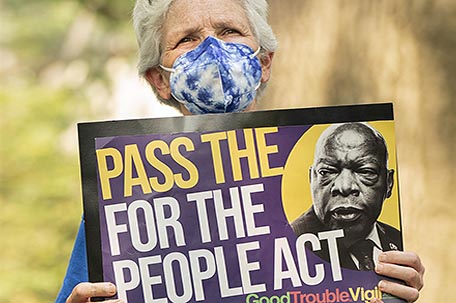
ABOVE PHOTO: Cathy Hook, of Upper Marlboro, Md., holds a poster of John Lewis during a rally for voting rights, Tuesday, Sept. 14, 2021, on Capitol Hill in Washington. (AP Photo/Jacquelyn Martin)
During last week’s annual gathering of the Congressional Black Caucus, two panels devoted to the John Lewis Voting Rights Act and voting restrictions proposed around the country focused on taking action to preserve the franchise.
By Denise Clay-Murray
One of the people that almost everyone made it a point to seek out during a Congressional Black Caucus Foundation gathering was the late Congressman John Lewis.
And when you talked with Congressman Lewis, the subject of voting, and how important it was for African Americans, ultimately came up. As someone who participated in the Voting Rights March from Selma to Montgomery, he knew what it was like to be denied that right and how that denial impacted your life choices.
During the recent Congressional Black Caucus Foundation legislative conference’s annual Voting Rights Braintrust, panelists talked about the ways that voting rights were being threatened, what citizens need to know, and how HR-4, otherwise known as the John Lewis Voting Rights Act, could help preserve the franchise nationwide.
Since the Supreme Court’s Shelby County v. Holder decision dismantling Section 5 of the 1965 Voting Rights Act requiring pre-clearance from the Department of Justice for states with a history of voter suppression, many of these states, most notably Texas and Georgia, have enacted legislation repressing voting rights under the guise of preventing voter fraud.
Add former President Donald Trump’s unsubstantiated claims of voter fraud and Republican-controlled state legislatures willing to prop up this contention and a Supreme Court willing to strike down even more provisions of the Voting Rights Act, and you get the current voting rights landscape.
“Just this year, state legislatures have already introduced 400 bills to restrict the right to vote,” said Congresswoman Terri Sewell of Alabama. “And in 18 states, 30 of these bills have become law. The need for federal oversight has never been more urgent.”
In August, Sewell introduced HR-4. It’s been passed by the House of Representatives, but it hasn’t gotten through the Senate and may not be heard this session due to the Senate’s filibuster rules.
Much of the discussion in the two panels moderated by political consultant and NPR Political commentator Angela Rye centered on ways that citizens, businesses and influencers could push Congress to act to preserve voting rights.
Right now, it’s easy for people to see the issue of voting rights as partisan, said Sherrilyn Ifill, director of the NAACP Legal Defense and Education Fund. Most of the people advocating for action to retain voting rights just happen to be Democrats, she said.
But it’s not a partisan issue, Ifill said. And while more Americans are starting to understand that voter suppression is bad and threatens the integrity of American democracy, it’s important to know that the reason for voter suppression in 2021 is the same as it was in 1961: the preservation of White supremacy.
“I lead an organization founded by Thurgood Marshall,” she said. “And when Marshall retired from being a Supreme Court justice, he was asked what his most important case was. Now I’m sure that both you and I would have thought he would answer Brown versus Board of Education, the landmark 1954 case that ended legal segregation in schools and began to take the brick out of the wall that crumbled legal segregation in this country. But Marshall actually said Smith vs Allwright, a case he won in the United States Supreme Court in 1944, when the court struck down the use of all-white primary elections by the Democratic Party in Texas.”
“The reason I wanted to begin with that is because the issue of voter suppression against racial minorities in this country has never been a partisan issue. As a matter of fact, we have stayed in the same place we’ve been. It may be that certain political parties have moved, but we are saying the same things that we have been saying.”
“Change rarely comes in the halls of Congress,” she said. “It comes on the streets of America through grassroots activism, through collective coalition building, and to making sure that we are all on the right side of history when it comes to voting rights.”
Voting rights is only half the battle that HR-4 addresses. The other half is the ability to pick your own representation without having those decisions nullified, said Stacey Abrams, founder of Fair Fight and an organization that addresses gerrymandering, Fair Count.
While winning elections is important, that means nothing if those results aren’t respected or can be nullified by law, Abrams said.
“There’s nothing fair about the fight, which is why we exist,” Abrams said. “This isn’t just about winning elections. This is about the fundamental nature of the kind of country we want to be. And we have over the last 20 years watched stable democracies fall to authoritarianism. We pretend that that could never happen to us. And we know it’s not true.”
“What we are fighting for is three things,” Abrams continued. “One is the right to vote, which undergirds the nature of democracy. The second part is having the right to elect the people who represent you. And that’s the work that “Fair Count really looks at ‘Who do we get to pick?’ And then the third piece is really pushing back against the subversion of our democracy, the bills that we are seeing passing in Texas, in Georgia and Iowa, these laws will allow them to overturn elections,” Abrams said. “And if we forget, the goal of January 6, was the subversion of our democracy. And thus, if we do not stand up and pass these bills, that will push back against the attempt to not only stop us from participating, but to take away our choices. And then to silence our voices. We will no longer have a democracy that’s worth speaking of in this country.”
When it comes to voting rights, knowing the history is important, said former Attorney Gen. Eric Holder. Since leaving public office, Holder, along with former President Barack Obama, has been working to end gerrymandering, the practice that allows legislators to pick their voters instead of the other way around.
The efforts to maintain single party rule in many places are a direct threat to the republic in general, and communities of color in particular, Holder said.
“[Gerrymandering] kept one party in power, far beyond the number of votes that that party received,” he said. “And we’ve seen this happen on both sides, you know. Both sides have engaged in gerrymandering, as long as we have been a republic. But that doesn’t mean it’s necessarily a good thing or something that we should continue. We should be concerned about what this means for minority representation at the state level, and at the federal level. Communities of color want to be considered in their entirety.”
In the end, it’s about making sure that everyone’s voice is heard.
“When I think about HR-4, it’s not just about restoring federal oversight,” Sewell said. “It’s not just about reinstituting preclearance. It’s also about clarifying section two of the Voting Rights Act. The Voting Rights Act is the most seminal and most consequential piece of legislation in the 21st century, and it only makes sense when you think about the fact that every American should have an equal access to the ballot box. At the end of the day, your vote is your voice in this democracy, and everyone’s voice should matter.”
















Leave a Comment